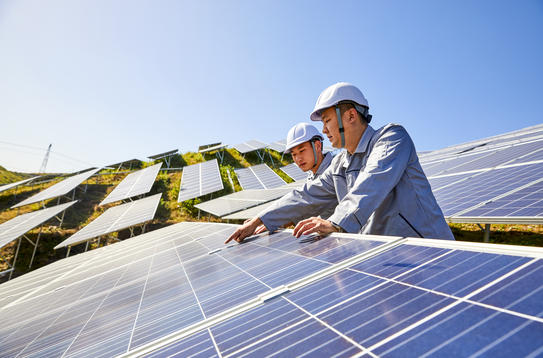Revealed: most challenging places in the world for businesses to switch to 100% renewable electricity – new report
- Asia-Pacific markets are among the most challenging in the world for businesses seeking to go renewable but also offer the biggest opportunities for clean investment and growth.
- Although renewables are now the cheapest sources of energy in most markets, limited availability, regulatory complexity, and the high costs these cause are currently acting as barriers in these 10 most challenging markets.
- The findings from an RE100 report are based on data from 261 major businesses committed to 100% renewable electricity, working with the Climate Group and CDP.
- Despite the challenges, company appetite for clean energy is still growing. Today, 7/11 parent company Seven & i Holdings, Capgemini, Charles River Laboratories, Nexans, and Noritz Corporation are all joining RE100.
Asia-Pacific markets are among the most challenging in the world for ambitious global companies switching to 100% renewable power – but addressing these represents some of the biggest unrealised opportunities for clean investment in the region, a new report reveals today.
These findings, in the week of the 5th anniversary of the Paris Agreement, show governments still have a great deal more to do to take advantage of business demand to go green.
Businesses reporting the challenges include many of the largest companies in the world, brought together by RE100, the global renewable energy initiative led by international non-profit the Climate Group in partnership with CDP. In total, they have experience of purchasing clean power in over 120 markets worldwide. Together, they consume more electricity than Australia, and are set to spend over US$98 billion to reach their 100% goals.
Australia, mainland China, Indonesia, Japan, Singapore, South Korea, and Taiwan are among the 10 most difficult geographies cited by RE100 members for sourcing renewables. For some of the companies making the most progress this is making a global 100% goal difficult to achieve.
More needs to be done to realise the scale and speed of demand-driven renewables investment that regions such as Europe and North America are already enjoying.
Fully removing the barriers would be an efficient way to help countries such as South Korea, Japan and China progress quickly towards their recently announced net-zero goals with little to no cost to public finances.
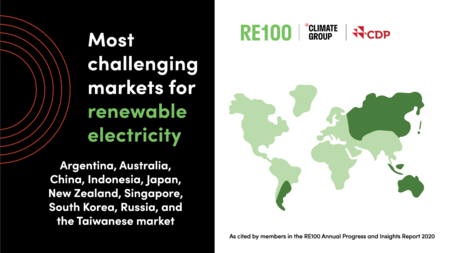
The 10 specific markets most mentioned* as challenging in the survey are:
• Argentina: Renewables not available for corporate sourcing
• Australia: Renewables costs still higher than other markets
• Mainland China: Regulatory complexity; in some regions renewables not readily available for sourcing while in a few others curtailment remains a challenge
• Indonesia: Limited options to purchase renewables
• Japan: Renewables costs higher than other markets; limited availability due to shortage of certificates
• New Zealand**: Insufficient sourcing options, in particular no tracking system currently in place (despite abundant renewables on the grid)
• Russia: Energy Attribute Certificates currently not available to purchase and other sourcing options are limited
• Singapore: Limited renewables availability; physical space to build new capacity unavailable
• South Korea: Corporate sourcing of renewables not yet available
• Taiwan: Prohibitive renewables costs
* Between 11 and 18 major companies cited barriers in each market.
**The New Zealand case is more an accounting issue than a climate issue. It has a very high share of renewable electricity (80%), but it’s not possible for companies to make a unique claim to those renewables, due to a lack of tracking systems.
The RE100 Progress and Insights Annual Report being launched today, includes results from sustainability professionals in the 261 companies that were members of RE100 in September 2020. Sectors include retail, IT, financial services, healthcare, biotechnology and manufacturing.
Growing business demand for renewables in Asia Pacific
Other results in the survey show that the facilities and operations of RE100 members are running on 81% renewable electricity in Europe, and 59% in North America, while in Asia-Pacific the figure is as low as 16%.
Yet 42% of new joiners came from Asia-Pacific in the last year. With members increasingly engaging manufacturing supply chains on the need to switch to renewables (now 52% of responding companies), Asia-Pacific represents the fastest growing region for business demand for clean energy.
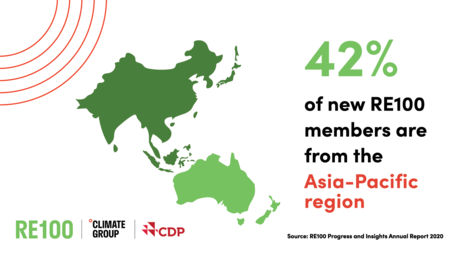
One example of the unrealised investment opportunity for Asia-Pacific comes from direct power purchase agreements (PPAs) which represent direct trade between renewable electricity suppliers and corporate buyers of all sizes.
According to BloombergNEF there have only been 75 off-site corporate PPAs in the Asia-Pacific region to date, totalling 4,475 megawatts (MW). This compares to 233 in Europe (14,087 MW) and 959 in the US (43,170 MW), where market conditions are more favourable. In many challenging Asia-Pacific markets, the opportunity lies in governments more easily allowing these deals to be made.
“Corporate demand for renewables is driving down costs and driving up investment across the world. However, some markets are not benefitting as much as they could from this demand-driven energy revolution, due to outdated regulation, and high costs that often result. Tackling these issues should be an easy win for governments seeking a green economic recovery from COVID, bringing major benefits to public finances rather than costs.”
“Corporate demand for renewables is driving down costs and driving up investment across the world. However, some markets are not benefitting as much as they could from this demand-driven energy revolution, due to outdated regulation, and high costs that often result. Tackling these issues should be an easy win for governments seeking a green economic recovery from COVID, bringing major benefits to public finances rather than costs.”
Andrew Glumac, Senior Manager, Renewable Energy, CDP, added, “We’ve already seen some positive steps with Japan, South Korea and the Taiwanese authorities recognising RE100 as a real driving force for change, through companies’ direct operations and increasingly those of their suppliers. China is also a global leader in renewables production and investment. Now we need better integration of energy and climate policy in these more challenging markets to boost investor confidence, lower emissions, and help deliver a green recovery.”
Xavier Houot, Senior Vice President, Schneider Electric, noted, “As an RE100 member ourselves, and as a leading advisor to organisations worldwide on energy efficiency and renewable energy procurement, we’ve experienced some of the barriers identified. We hope more markets will soon provide viable, credible, affordable solutions to help us meet our own ambitions to achieve 100% renewable electricity, while unlocking opportunities for voluntary corporate buyers to continue to meet their commitments as well. The growth of the corporate renewable electricity market is a strategic lever to fast-track the transition to clean power and carbon reduction. Countries have a historical opportunity to lead and enable faster decarbonisation of the world energy mix. Together, by aligning efforts, we can make an impact.”
Latest results on power purchase agreements
The report also shows that PPAs, which provide long-term price stability and increase renewable energy capacity on electricity grids, are increasingly popular with RE100 companies – now accounting for a quarter of renewable power sourced by members globally.
Helen Dewhurst, Corporate Sustainability Associate, BloombergNEF, commenting on the findings, said, "In spite of Covid-19, the Asia Pacific region has had a bounce-back year in PPA activity in 2020, largely driven by deals in Australia and a 920 MW offshore wind PPA announced in Taiwan – the largest ever. Despite the growth, the region is still to realise its potential. There are still a number of policy barriers holding the market back, and it's essential for these to be removed if the growth in activity we've seen is to continue."
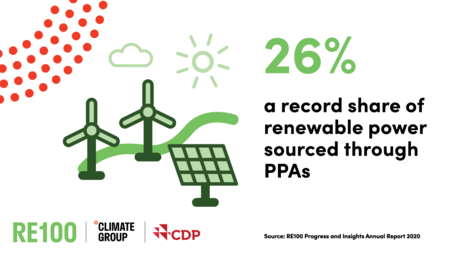
Some further market detail
SOUTH KOREA
In today’s report, 14 RE100 members cite South Korea as a challenging market. A lack of availability and regulatory barriers are the main challenges.
According to BloombergNEF, South Korea will miss its 2025 42.7GW wind and solar target – by almost 75%. Development lead times for offshore wind projects are long (10 years), and companies are unable to sign direct PPAs with energy companies or Kepco, the national utility. On-site renewable electricity generation is allowed, and some RE100 companies have been able to source small volumes of renewables this way. But despite recent pilots, there is no official system for companies to purchase renewable electricity attribute certificates.
There is reason for optimism, however, with the introduction of the Government’s Green New Deal. From January 2021, in line with South Korea’s new goal to reach net zero emissions by 2050, the Green New Deal is expected to encourage third-party PPAs and introduce Korea Renewable Energy Guarantees of Origin (K-REGOs) – the latter after a six-month delay.
TAIWANESE MARKET
12 RE100 companies report challenges in the Taiwanese market, accounting for one in four members reporting on their electricity use there. They cite prohibitive costs as the biggest challenge.
According to BloombergNEF, ground-mounted solar photovoltaic (PV) projects cost twice as much to build in Taiwan as in mainland China. This is because of the higher cost of land, more expensive modules, and fatter margins for Energy Performance Certificate (EPC) contractors due to a lack of local competition.
BloombergNEF data shows that the first offsite PPAs arrived in 2019 (Google signed for 10 MW). More than 1,600 MW was signed for in 2020, mostly by Taiwan Semiconductor Manufacturing Company (TSMC). Yet as a new RE100 briefing showed last week, sourcing renewables and scaling up purchases is still a challenge for many companies. Last year, the leader of the Taiwanese authorities publicly recognised the growing number of RE100 members requiring suppliers to use renewable electricity. The Renewable Energy Development Act was amended to enable energy companies to sell renewable power through wheeling and direct supply.
But according to Bloomberg NEF, the high feed-in tariff (FiT) is currently making it financially unattractive for solar power generators to terminate their contracts with Taipower in order to supply to companies. The authorities must work with developers to evaluate ways of lowering costs and translating that into lower prices for voluntary purchases of renewable electricity.
TCI, the first Taiwanese company to join RE100, successfully signed a PPA in October, but only for a limited volume.
“We’re not a small company by any means but it’s still hard to find renewable energy companies who are willing to offer affordable deals for wind. As more companies join RE100, and ask suppliers in Taiwan to use renewable electricity, it’s hard to see how renewable energy supply will keep pace with the growing demand.”
“We’re not a small company by any means but it’s still hard to find renewable energy companies who are willing to offer affordable deals for wind. As more companies join RE100, and ask suppliers in Taiwan to use renewable electricity, it’s hard to see how renewable energy supply will keep pace with the growing demand.”
Stein Haugan, Director of Business Partnerships, EMEA, 3Degrees, said, “We work with companies to address their global Scope 2 emissions footprint by investing in renewable energy in many different countries. So a customer who has purchased renewables in other regions can easily have sticker shock when they try to make a purchase in Taiwan. The price differential can be substantial."
Hugo Asplund, Commercial Director, Dairy Farm IKEA North Asia, speaking at the inauguration ceremony of the Taiwan Green Industry Alliance in Taipei recently, said, “We’re applauding the efforts of the Taiwanese government to reach a 20 per cent level renewable energy share by 2025. Looking ahead to 2030 we would like to see that ambition being raised significantly to make renewable energy more available to more companies. Another thing we need is to make sure that renewable energy is affordable.”
JAPAN
12 RE100 companies report challenges in Japan, accounting for one in six members reporting on their electricity use there. They cite high costs of renewables and limited availability as the biggest problems.
Large-scale procurement options are limited to hydro plants operated by regional utilities and FiT-certified renewables. Certificates are in high demand, but Japan’s tracking systems are fragmented and comparably difficult to navigate.
Currently, businesses must pay a high price for Green Energy Certificates, J-Credits, or Non-Fossil Fuel certificates (NFCs) which meet RE100 criteria. According to BloombergNEF, self-generation (e.g. rooftop solar PV) can only cover a small part of the electricity demand of commercial buildings in Japan (5-20%, with RE100 members at the lower end).
Yet there is reason for optimism. Renewable electricity consumption has risen substantially in Japan over the last five years following the introduction of the FiT. Then in early 2020, the growing demand for renewable electricity from RE100 members was cited in Japan’s COVID-19 economic stimulus package as a reason for allocating almost US$50 million (¥5 billion) to help develop onsite PPAs.
As the Government revises its Basic Energy Plan over the coming months, there is a key opportunity to unlock further corporate sourcing of renewables. A more ambitious renewable electricity goal would send a positive market signal. Allowing offsite corporate PPAs between consumers and generators directly will lead to more market competition and drive down costs.
Stein Haugan, Director of Business Partnerships, EMEA, 3Degrees, said, “There's been strong (or increased) demand for J-Credits from international RE100 companies, which is a positive trend. But when you add on the demand from Japanese companies and local suppliers, the renewables supply in this market gets extremely tight. As a result, it can be challenging for companies to hit their renewables targets in Japan."
Masafumi Okuda, CSR Dept. AEON Co., Ltd, shared, “We have installed PV panels on the rooftops of as many of our stores as possible – more than 1000 sites – but they only account for a small fraction of our total electricity use. We have been exploring options such as on-site PPAs and procuring surplus electricity. While the actual power generation cost is not very high, there’s a renewable surcharge, and wheeling charges and transmission costs for off-site PPAs. We hope the procuring cost of renewables will become more economical for consumers who aggressively promote the installation of renewable energies.”
“The main barriers in Japan are the high cost of renewable energy due to policy and market structure, and the shortage of tracked renewable energy certificates as allowed by RE100. However, with the new 2050 carbon neutrality goal, the strengthening of the power grid system, deregulation and a 2 trillion-yen decarbonisation research fund, the next 10 years will be a period of great change for the renewable energy market in Japan.”
“The main barriers in Japan are the high cost of renewable energy due to policy and market structure, and the shortage of tracked renewable energy certificates as allowed by RE100. However, with the new 2050 carbon neutrality goal, the strengthening of the power grid system, deregulation and a 2 trillion-yen decarbonisation research fund, the next 10 years will be a period of great change for the renewable energy market in Japan.”
AUSTRALIA
11 RE100 companies report challenges in Australia, accounting for one in six members reporting on their electricity use there. Members surveyed in September 2020 say renewables costs are still higher than other markets.
BloombergNEF data shows that in 2013-2020 over 3,800 MW of renewable electricity was installed in Australia through offsite wind and solar PV. Yet while several RE100 companies have successfully signed PPAs (e.g. Unilever, Mars. Inc, Salesforce), others are unable to because their loads are too small. Instead, they look to purchase renewable electricity attribute certificates.
It is vital that the Australian government increases investor confidence.
Jan Gardberg, IKEA Australia Country Manager and Chief Sustainability Officer, said, “For our customers we see Australia as a perfect market for mass uptake of home solar, which is why earlier this year we were very pleased to launch the IKEA home solar system – SOLSTRALE. With the right signals and policy from government, Australia has the potential to lead the world in renewable energy. We would love to see a future where renewable energy plays a major role in our Australia’s economic prosperity.”
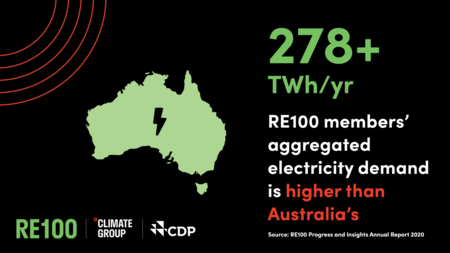
ENDS
Contact
For more information, the embargoed report, or to arrange an interview (e.g. with RE100 member companies), contact:
Marie Reynolds, Senior Communications Manager – Business Initiatives, the Climate Group: MReynolds@theclimategroup.org
Tegan Tallulah, Communications Manager, CDP Tegan.Tallullah@cdp.net, tel: +44 (0) 203 818 3915
Notes to editors
- Despite challenges presented by COVID-19 this year, companies continue to make the RE100 commitment. Today, Capgemini commits to reaching 100% by 2025, Charles River Laboratories by 2030, and Nexans by 2030. Nortiz Corporation and 7&i Holdings, both based in Japan, are targeting 2050.
- The 261 reporting members of RE100 have an electricity consumption of over 278 TWh/yr. According to the International Energy Agency (IEA) Australia consumes 247.6 TWh/yr https://webstore.iea.org/login?ReturnUrl=%2fdownload%2fdirect%2f4093%3f…
- The RE100 Progress and Insights Annual Report presents 2019 data disclosed by 261 members through the 2020 RE100 reporting spreadsheet or the CDP climate change questionnaire:
152 provided a market breakdown of their (renewable) electricity consumption
141 provided data about supplier engagement
135 provided data on their renewable electricity strategy
129 provided data about drivers for switching to renewable electricity
138 provided data about the barriers they face
66 provided data on geographical barriers
131 provided data about potential cost savings
112 provided data on RE100 commitment benefits
- Several RE100 member companies, market experts, and regional commentators are willing to speak to media, including Ingka Group, Ricoh, Schneider Electric, TCI, 3 Degrees, BloombergNEF, CIER, JCLP, and the Korean Society for New and Renewable Energy (KSNRE).
- According to the International Renewable Energy Agency (IRENA), renewable energy technologies now represent the most economical solution for new capacity in a growing number of countries and regions: https://www.irena.org/costs/Power-Generation-Costs.
- BloombergNEF estimated that 221 RE100 companies would need to invest US$98 billion in renewable energy to meet their 100% targets: https://about.bnef.com/blog/corporate-clean-energy-buying-leapt-44-in-2…. More recently, BloombergNEF estimated that 242 RE100 companies will need to purchase an additional 224TWh of renewable electricity in 2030 to reach 100% - more than all the electricity generated in Vietnam. https://renews.biz/62367/corporate-clean-power-demand-outstripping-supp….
- To advocate for change at the global level, the RE100 initiative has six global policy asks, backed by RE100 companies, to governments in every market.
About RE100
RE100 is a global initiative bringing together the world’s most influential businesses committed to 100% renewable power. Led by international non-profit the Climate Group in partnership with CDP, the group have a total revenue of over US$6.6 trillion and operate in a diverse range of sectors. Together, they send a powerful signal to policymakers and investors to accelerate the transition to a clean economy. #RE100
About the Climate Group
The Climate Group drives climate action. Fast. Our goal is a world of net zero carbon emissions by 2050, with greater prosperity for all. We focus on systems with the highest emissions and where our networks have the greatest opportunity to drive change. We do this by building large and influential networks and holding organisations accountable, turning their commitments into action. We share what we achieve together to show more organisations what they could do. We are an international non-profit organisation, founded in 2004, with offices in London, New Delhi and New York. We are proud to be part of the We Mean Business coalition. Follow us on Twitter @ClimateGroup.
About CDP
CDP is a global non-profit that drives companies and governments to reduce their greenhouse gas emissions, safeguard water resources and protect forests. Voted number one climate research provider by investors and working with institutional investors with assets of over US$106 trillion, we leverage investor and buyer power to motivate companies to disclose and manage their environmental impacts. Over 9,600 companies with over 50% of global market capitalization disclosed environmental data through CDP in 2020. This is in addition to the hundreds of cities, states and regions who disclosed, making CDP’s platform one of the richest sources of information globally on how companies and governments are driving environmental change. CDP is a founding member of the We Mean Business Coalition. Visit https://cdp.net/en or follow us @CDP to find out more.
